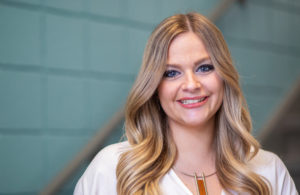 Since the first grade, Aliza Legg was told to expect to fail. From the moment she was diagnosed with dyslexia, she was told that her goal in life should not be college or a career, but to hope to be able to shop on her own one day.
Since the first grade, Aliza Legg was told to expect to fail. From the moment she was diagnosed with dyslexia, she was told that her goal in life should not be college or a career, but to hope to be able to shop on her own one day.
When she reached middle school and her classmates started learning foreign languages, Legg was told she wasn’t allowed to — because learning a different language would make her English worse. After her mother disputed the matter for three years with the school, Legg was finally allowed to take a Spanish class.
“And they told [my mother] that this would be her fault when I failed, it’s going to be on you, it’s going to make the rest of my classes worse, and bring my GPA down. All of these things,” says Legg. “But my mom said, ‘Let’s just try.’”
Spanish turned out to be her strength — Legg has earned an A in every Spanish class she’s taken.
“The interesting thing was that the work I had to put into Spanish was way less than any of my other classes,” says Legg. “I kept wondering, ‘why was it taking so much less work and effort, why was it coming so easily to me?’ It was almost like it was giving my brain a break to switch from something else.”
When Legg started her first year at Allegheny, she expected to graduate as a chemistry major. All that changed when she took a neuroscience class on a whim and found her curiosities ignited. Neuroscience fit everything she was looking for: studying up-close how people process and react to incoming information.
Now a neuroscience major, Legg is diving back into her past through her senior comprehensive project by researching protocols in place for students with dyslexia learning a foreign language.
“I started to look into the research, and it supports that there’s no deficit with a student or person with dyslexia learning a foreign language,” says Legg. “So I thought where’s the disconnect here? I went to Dr. Aimee Knupsky in the Psychology Department, who specializes in human cognitive processes, and she was so excited that I was so passionate and so excited about doing something that’s so personal to me. She was 100 percent so supportive and is the reason why it was able to happen here.”
Legg’s comp isn’t the only way she’s working to make things better for others with dyslexia. Every summer she works with the Provident Charter School of Pittsburgh and meets with new teachers at orientation to talk about what learning is like as a person with dyslexia, and Legg suggests ways they can support students like her. These efforts and Legg’s scholarly persistence led the Provident Charter School to present her with the Champion Award in October 2019. The award is given to individuals with dyslexia who have been very successful.
“This was the biggest surprise,” says Legg. “I just hope this shows all of those little kids out there that are sitting in tutoring after school, when they’re exhausted and have to do all this extra work and aren’t understanding why they can’t do it like their brother or sister or best friend, that it’s OK.”
Legg is just the third recipient of the Champion Award. Past recipients of the award include Taylor Washington of the Pittsburgh Riverhounds and Kevin McClatchy, former owner of the Pittsburgh Pirates.
“Aliza has not let her dyslexia stop her from doing the work she’s always wanted to do,” says Knupsky. “Now, she is working to make foreign language learning equitable and attainable for all students. Her work is not only an individual journey; it is a journey she has undertaken to help others. That’s inspiring.”
After graduating this spring from Allegheny, Legg plans to pursue a career in clinical psychology. She feels her unique perspective will enable her to support those who see things differently and process information in unconventional ways.
“In so many areas of my life that I’ve now learned, thinking differently is what sets me apart and what makes me so advanced,” says Legg. “I was always labeled as a disability, and I think showing people that it’s not a bad thing and they’re special and they have things that other people don’t, focusing on strengths and working on weaknesses, is something I could really help with. Dyslexia is not a life sentence; it’s actually a gift.”